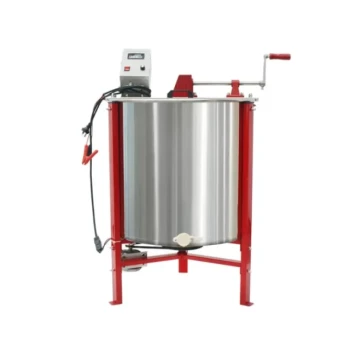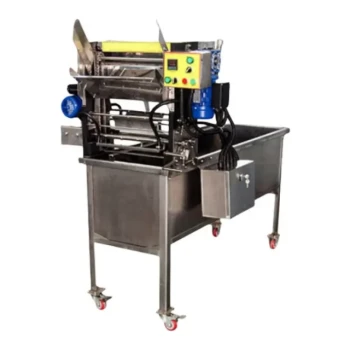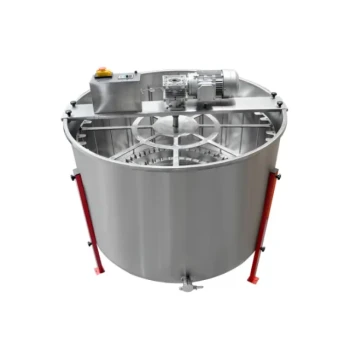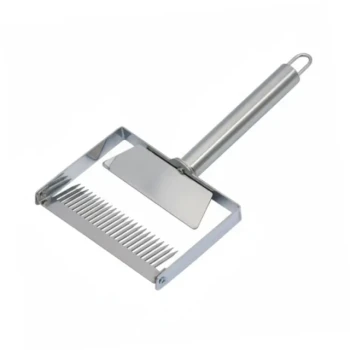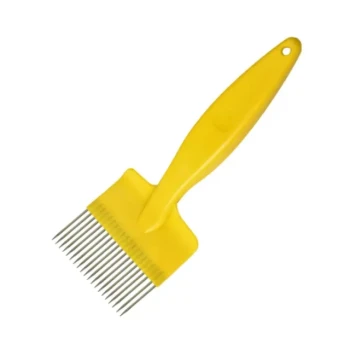At its core, honey is extracted from a frame's honeycomb using one of two primary methods: centrifugal force or simple compression. The most common approach for most beekeepers uses a machine called an extractor to spin the honey out. A more traditional method involves crushing the comb to release the honey and then straining it.
The method you choose is a strategic decision. Centrifugal extraction preserves the valuable drawn-out comb for your bees, saving them enormous energy, while the crush and strain method is simpler for small-scale operations and yields a bonus harvest of beeswax.
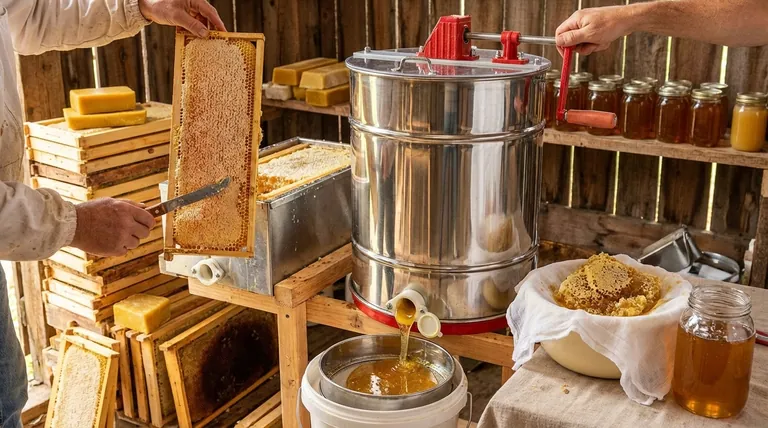
The Prerequisite: Ensuring Your Honey is Ready
Before any extraction can begin, you must verify that the honey is "ripe." This single step prevents your harvested honey from spoiling.
Inspecting for "Capped" Honey
A frame is ready for harvest when the bees have "capped" the honeycomb cells with a fresh, yellow-white layer of beeswax. For a standard ten-frame honey super, a harvest is typically viable when at least seven or eight of the frames are fully capped.
Why Capping Matters
This wax cap is a critical signal. It indicates that the bees have reduced the honey's moisture content to the correct level (typically below 18.6%). This low moisture content is what makes honey naturally shelf-stable and prevents it from fermenting after you harvest it.
Method 1: Centrifugal Extraction (The Standard)
This is the most common method for beekeepers of all but the smallest scales. It is efficient and, most importantly, preserves the honeycomb for the bees to reuse.
Step 1: Uncapping the Frames
First, the protective wax caps must be removed. This is typically done with a specialized hot knife or uncapping plane that slices off the top layer of wax.
Other tools like an uncapping fork, scratcher, or roller can also be used to pierce the cappings and expose the honey within the cells.
Step 2: Spinning in the Extractor
The uncapped frames are placed inside a honey extractor, which is essentially a large drum that spins the frames at high speed.
As the extractor spins, centrifugal force pulls the liquid honey out of the comb. The honey slings against the inner wall of the drum, drips to the bottom, and collects.
Step 3: Straining and Storing
The raw honey flows out of a gate at the bottom of the extractor. It is then passed through a strainer or a series of strainers to remove bits of wax and other debris before being moved into a storage tank or final containers.
Method 2: Crush and Strain (The Simple Approach)
This method is straightforward, requires minimal specialized equipment, and is often favored by hobbyists with only one or two hives.
The Process: Pressing and Straining
With this technique, you simply cut the honeycomb out of the frames and crush it. This can be done with a simple tool or with a specialized honey press that squeezes the comb.
The resulting mixture of honey and wax is then placed over a strainer or cheesecloth, and the honey is allowed to slowly drip into a clean container below. The honey may be gently warmed in a water bath to improve its flow.
When to Use This Method
The crush and strain method is ideal for small-scale operations. It's also the preferred method for harvesting honey from foundationless frames, as the delicate comb can easily break apart during centrifugal extraction.
Understanding the Trade-offs: Extraction vs. Crush and Strain
Choosing a method is not just about process; it's about managing your apiary's resources.
The Value of Preserved Comb
The key advantage of centrifugal extraction is that it leaves the drawn-out honeycomb intact. Bees expend a tremendous amount of energy and resources to build this comb. Returning empty, intact frames to the hive allows the colony to immediately begin refilling them, dramatically increasing their potential honey production.
The Benefit of a Beeswax Harvest
The crush and strain method destroys the comb. However, this provides a significant secondary product: beeswax. The leftover wax can be washed and rendered into clean blocks for making candles, balms, or other products.
Equipment and Scale
A honey extractor represents a significant financial investment and is best for beekeepers managing several hives. The crush and strain method requires little more than buckets and strainers, making the barrier to entry extremely low.
Making the Right Choice for Your Apiary
Your goals as a beekeeper will determine the best extraction method for you.
- If your primary focus is long-term efficiency and maximizing honey production: Invest in an extractor to preserve your drawn comb.
- If you are a small-scale hobbyist or prioritize harvesting beeswax: The crush and strain method is a simple and effective choice.
- If you use foundationless frames: Be aware that the delicate comb makes crush and strain a safer option, though careful extraction is possible by starting slowly.
Understanding these methods and their trade-offs empowers you to manage your harvest in a way that best suits your goals and your bees.
Summary Table:
| Method | Key Process | Best For | Key Outcome |
|---|---|---|---|
| Centrifugal Extraction | Spinning frames in an extractor to fling honey out | Commercial apiaries, maximizing honey production | Preserves honeycomb for bees to reuse |
| Crush & Strain | Crushing comb and straining honey | Small-scale hobbyists, foundationless frames | Yields harvestable beeswax, destroys comb |
Ready to Scale Your Honey Harvesting?
Whether you're a commercial apiary aiming for maximum efficiency with centrifugal extractors or a distributor supplying beekeepers with the right tools, HONESTBEE is your partner. We supply durable, wholesale-focused beekeeping supplies and equipment—from extractors and uncapping tools to strainers and storage tanks—helping you maximize yield and streamline operations.
Contact our expert team today to discuss your specific needs and get a quote on high-performance extraction equipment.
Visual Guide
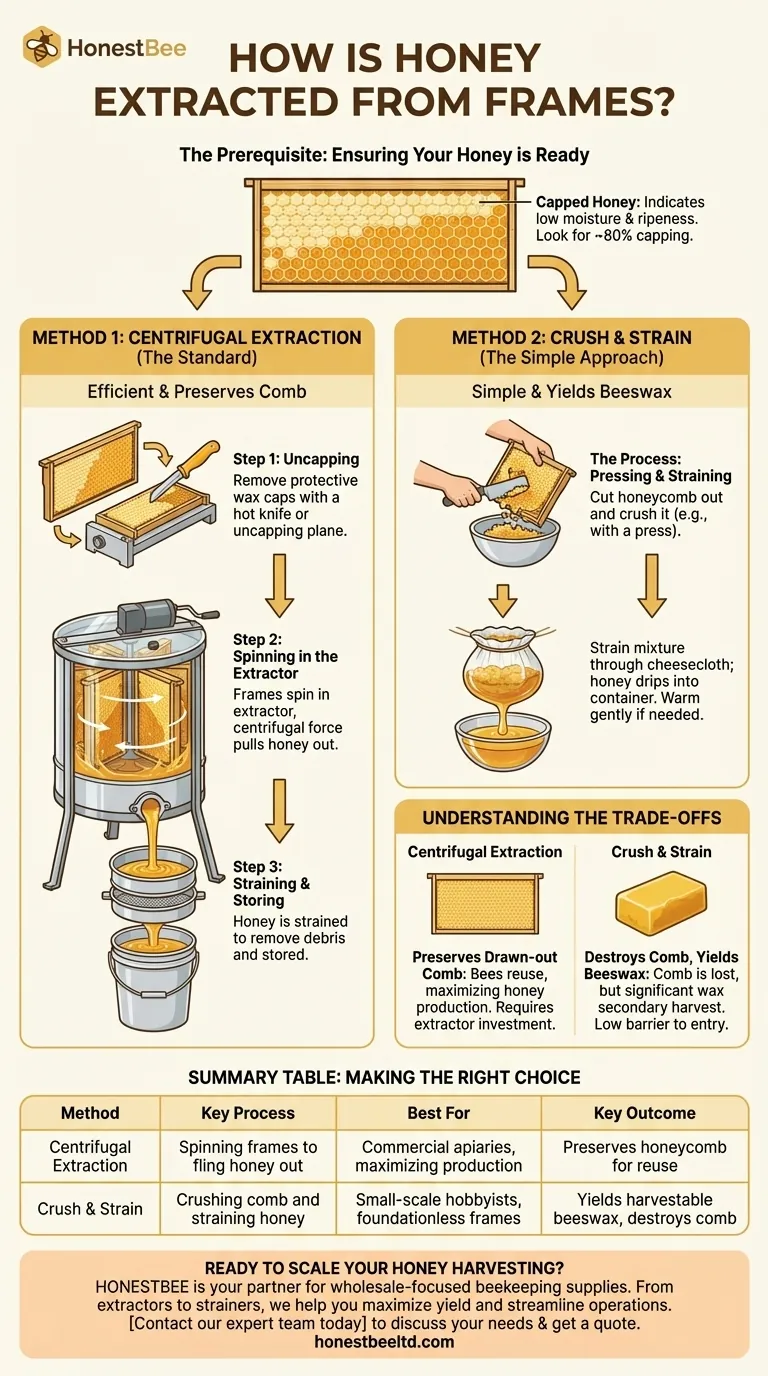
Related Products
- 2 Frame Stainless Steel Manual Honey Spinner Extractor for Beekeeping
- 6 Frame Manual Stainless Steel Honey Extractor Beekeeping Equipment
- Electric 8 Frame Honey Spinner Extractor Equipment for Beekeeping
- Easy Use Manual Stainless Steel Honey Press for Honey Comb
- HONESTBEE 8 Frame Electric and Manual Three Use Honey Extractor
People Also Ask
- How does centrifugation work in honey extraction? The Sustainable Method for Modern Beekeepers
- Can a manual extractor be upgraded to an electric one? Save Labor & Boost Efficiency
- How long does it take to extract honey with a manual extractor? A Guide for Hobbyist Beekeepers
- How do beekeepers harvest honey from the honey super? A Step-by-Step Guide to Efficient Extraction
- How can a pressure washer be used to clean a honey extractor? A Guide to Safe and Efficient Cleaning




